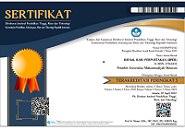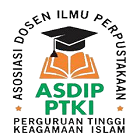STRENGTHENING DIGITAL LITERACY AS AN EFFORT TO BUILD LIBRARIAN SKILLS IN PROVIDING REFERRAL OPTIONS TO USERS
Abstract
Abstrack
The information society era 5.0 not only requires librarians to master information literacy, but also master digital literacy considering that the rapid flow of information occurs legally and illegally in cyberspace. Digital skills require librarians and users to interact interactively through the virtual world and the real world. Unfortunately, digital skills are still the main problem for librarians in carrying out their activities as professionals. practical ways such as providing references to users by relying on individual knowledge and individual preference tendencies cause users to be confused with the minimal references available and the librarian's ideology that affects references, when in fact it is not because of the availability of reference collections that availability is problematic but rather complicated collection classification methods and services. as well as the objectivity of selecting the right reference. technology, especially in the field of communication and information, is actually used to simplify activities, not to complicate them. Problems such as complex collection and service classification methods can be solved by mastering digital skills. This research tries to provide an overview of strengthening aspects of digital literacy for librarians. by using exploratory qualitative methods, aspects of digital literacy will be described through literature review and exploration of findings in the field. This research is expected to be able to answer the problem of information disruption which causes the need for library users to be hampered.
Full Text:
PDFReferences
Bahrudin, Muhammad dan Nursidik Fadillah. 2021. Mendefinisikan ulang keterampilan dan kompetensi pustakawan untuk mendukung ekosistem investasi di Indonesia: studi kasus di perpustakaan BSN, Informatio: Journal of Library and Information Science Vol. 1(3), 311-330.
Bennett, Scott. 2009. Libraries and Learning: A History of Paradigm Change1, Libraries and the Academy, Volume 9, Number 2.
Cordell, Rosanne Marie. 2013. Information Literacy and Digital Literacy: Competing or Complementary?. Journal of Communications in Information Literacy, Volume 7, Issue 2.
Gilster, P. (1997) Digital Literacy New York. John Wiley
John Seely Brown, “Learning in the Digital Age,” in The Internet and the University: 2001 Forum, ed. M. Devlin, R. Larson, and J. Meyerson (Boulder, CO: EDUCAUSE, 2000), 68–9, http://www.educause.edu/ir/library/pdf/ffpiu015.pdf (accessed January 12, 2009).
Kahn, R. & Kellner, D. (2006) Reconstructing Technoliteracy: a Multiple Literacies Approach” in Dakers, 2006b: 253-273.
Kellner, D. (2002) “Technological Revolution, Multiple Literacies, and the Restructuring of Education” in Snyder, 2002: 154-169.
Kress, G. (2003) Literacy in the New Media Age London. Routledge.
Lankshear, C. & Knobel, M. (2003) New Literacies: Changing Knowledge and Classroom Learning Buckingham Open University Press.
Martin, A. & Madigan, D. (ed) (2006) Digital Literacies for Learning London.
Martin, A. & Rader, R. (ed)(2003) Information and IT Literacy: Enabling Learning in the 21st Century London. Facet.
Martin, A. (2003) “Towards e-literacy” in Martin & Rader, 2003: 3-23.
Mayes, T. & Fowler, C. (2006) “Learners, Learning Literacy and the Pedagogy of e-Learning” in Martin & Madigan, 2006: 26-33.
McAlpine, M. (2005) “E-portfolios and Digital Identity: some Issues for Discussion” E-Learning, 2: 378-387.
Michael, M. (2006) “How to Understand Mundane Technology” in Dakers, 2006b: 49-63.
Ministry of Edication (2003) Digital Horizons: Learning through ICT New Zealand Minstry of Education Wellington Revised Edition, December 2003 (online at: http://www.minedu.govt.nz/web/downloadable/dl6760v1/digital-horizons-revision 03.pdf)
Partridge, Helen L. and Menzies, Victoria and Lee, Julie M. and Munro, Carrie (2010) The contemporary librarian : skills, knowledge and attributes required in a world of emerging technologies. Library and Information Science Research, 32(4). pp. 265‐271.
Pratama, Yoshua Gilang. 2021. Hubungan knowledge sharing dengan inovasi pengelola taman baca masyarakat di Jawa Barat, Informatio: Journal of Library and Information Science Vol. 1(1), 1-16
Quroatun ’uyun, Zafirah and Hakim. 2020. Cyber Culture Of Social Media: Identity As Trash Of Information. Orasi: Jurnal Dakwah dan Komunikasi. Volume 11 no. 1
Rader, H. (2003) “Information Literacy – a Global Perspective” in Martin & Rader, 2003: 24-42
Ruslan. 2022. Critical Information Literacy in the Post-Truth Era: A Strategy for Facing Information Flow in Indonesia. Adabiya, Volume 24, No 1
Snyder, I. (ed) (2002) Silicon Literacies London. Routledge
Søby, M. (2003) Digital Competence: from ICT skills to digital “bildung” Oslo ITU, University of Oslo
Street, B. (1984) Literacy in Theory and Practice Cambridge. Cambridge UP Town, S. (2000) “Wisdom or Welfare? The Seven Pillars Model” in Corrall & Hathaway, 2000: 11-21
DOI: https://doi.org/10.31764/jiper.v4i2.11106
Refbacks
- There are currently no refbacks.
Jurnal Ilmu Perpustakaan (JIPER)
Program Studi Perpustakaan dan Sains Informasi
Fakulatas Ilmu Sosial dan Ilmu Politik Universitas Muhammadiyah Mataram
Jln. K.H. Ahmad Dahlan No. 1 Kota Mataram, Nusa Tenggara Barat, Indonesia
Email: [email protected]; e-ISSN: 2716-0432
-------------------------------------------------------------------------
Licengcing:
This licensed under a Creative Commons Attribution-ShareAlike 4.0 International License.
-------------------------------------------------------------------------
Indexing by:















